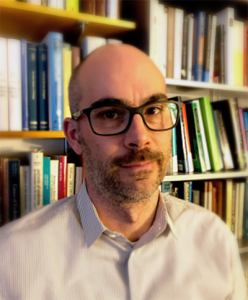Presented By: Science, Technology and Society
STS Speaker. Catastrophic Thinking in Science and Culture: Geo-Eschatology and the Anthropocene
David Sepkoski, University of Illinois/Urbana-Champaign

The specter of extinction looms large in the late-modern Western psyche. As a cultural "imaginary," extinction is perhaps the distinctive post-WWII anxiety. Since the 1950s, visions of nuclear annihilation, mass famine, environmental collapse, biodiversity loss, and other self-inflicted catastrophes have haunted literature, art, film, popular media, and political discourse as central preoccupations. Indeed, one of the main imagined consequences of the ongoing climate crisis is the production of a "Sixth Extinction"--a collapse of biological diversity that may rival the great mass extinctions of the geological past and threaten the future of human civilization.
Not coincidentally, the second half of the 20th century also saw a dramatic revival among geologists and paleontologists of theories involving catastrophic mass extinctions as central agents in the history of life. This talk will explore the interpenetration of these scientific and cultural discourses during the 20th century. In particular, I will argue that our current cultural fascination with the so-called Anthropocene is a direct consequence of the fusion of the geological and the eschatological meanings of extinction: extinction thinking may in fact be the bridge between the deep past and imagined future of our species and our planet.
David Sepkoski is the Thomas M. Siebel Chair in History of Science and Professor in the Department of History at the University of Illinois, Urbana-Champaign. He has published widely on histories of biology, the earth and environmental sciences, and data. His most recent book is Catastrophic Thinking: Extinction and the Value of Diversity from Darwin to the Anthropocene.
Not coincidentally, the second half of the 20th century also saw a dramatic revival among geologists and paleontologists of theories involving catastrophic mass extinctions as central agents in the history of life. This talk will explore the interpenetration of these scientific and cultural discourses during the 20th century. In particular, I will argue that our current cultural fascination with the so-called Anthropocene is a direct consequence of the fusion of the geological and the eschatological meanings of extinction: extinction thinking may in fact be the bridge between the deep past and imagined future of our species and our planet.
David Sepkoski is the Thomas M. Siebel Chair in History of Science and Professor in the Department of History at the University of Illinois, Urbana-Champaign. He has published widely on histories of biology, the earth and environmental sciences, and data. His most recent book is Catastrophic Thinking: Extinction and the Value of Diversity from Darwin to the Anthropocene.